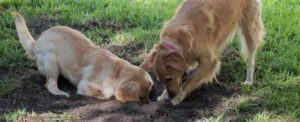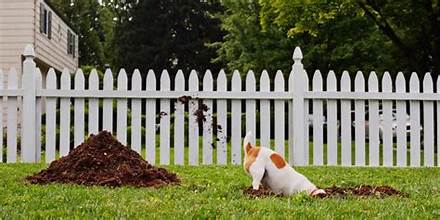Professional training can be a valuable resource for support dogs, providing them with the skills and guidance they need to support children with special needs effectively. Dogs love to dig. It’s instinctual, natural—and sometimes, destructive. But when your dog is also a support companion for a child with special needs, digging becomes more than just an annoying habit. It can disrupt safe play spaces, create hazards in the yard, and even cause emotional stress for your child when their calming companion acts out.
Thankfully, with a few calm and consistent strategies, you can help your dog redirect that digging energy while maintaining a safe, structured environment your child can trust.
💡 Why Digging Becomes a Problem in Special Needs Homes
For children with autism, anxiety, ADHD, or sensory processing challenges, their dog often provides:

- Emotional regulation
- Routine consistency
- A safe sensory experience outdoors
But if your dog starts digging:
- The yard becomes less predictable and more chaotic
- When your dog starts digging, your child may become distressed by sudden changes or “messes.” This can cause emotional stress and disrupt the calming effect that the dog is meant to provide.
- Risk of falls, muddy clothing, or broken routines increases
🐾 What’s Causing the Digging?
Before you correct the behavior, try to understand the reason. Common causes include:

- Boredom or lack of stimulation
- Anxiety or excess energy
- Trying to escape
- Hunting behavior
- Seeking a cool place to lie down
🎯 For support dogs, boredom and under-stimulation are often the biggest triggers.
✅ Solutions That Fit Your Family’s Needs
1. Create a Sensory-Friendly “Dig Zone.”
If your dog needs to dig, give them a dedicated space.
- Fill a sandbox with soft soil or sand
- Hide safe toys or treats for enrichment.
- Use clear visual boundaries (pavers or a small fence)
👶 Let your child help “bury” treats or toys—this creates safe and cooperative playtime between dog and child.
2. Stick to a Daily Exercise Routine
Dogs with excess energy dig more. Try:
- A short walk in the morning and evening
- Indoor fetch with soft toys for rainy days
- A puzzle toy in the yard to engage their brain
🧩 Bonus: By involving your child in the exercise routine, you not only boost their sense of responsibility but also strengthen the bond between them and their support dog.
3. Supervise Yard Time with Structure
Allow your support dog outside only:
- During structured play
- When someone can supervise
- With a cool, shaded space and water nearby
🧒 Teach your child simple commands like “Leave it” or “Come” to gently redirect their dog from digging.
4. Use Positive Reinforcement
Never punish your dog for digging—it increases anxiety. Instead:
- Praise your dog when they play in acceptable ways
- Offer treats or attention when they ignore the digging zone.
- Redirect with a toy or a game.
💛 Tip: Children can use clickers or verbal cues (like “Good!”) to feel involved in training.
5. Protect the Yard While Teaching
Until the habit is gone:
- Use garden fencing or chicken wire over tempting spots
- Add citronella spray or safe dog deterrents in flower beds.
- Cover wet areas with mulch or a rubber mat.
🛒 Amazon Picks for Digging Distraction & Enrichment
(Safe and calming for dogs and sensory-sensitive kids)
- 🧩 Outward Hound Puzzle Feeder – Mental stimulation for high-energy dogs
- 🦴 Dog Sand Digging Box – Small DIY sandbox with hidden toy compartments
- 🐕 Clicker Training Set with Treat Pouch – Great for children to use during behavior shaping
- 💦 Pet Cooling Mat – Gives your dog a cool place to lie without digging
- 🧸 Plush Digging Toys – Soft, squeaky toys buried inside puzzle bases (great indoor alternative)
📝 Bonus: Printable “Outdoor Pet Routine Chart”
Includes space for:
- Daily walk time
- Yard time supervision
- Dig-free training progress
- Stickers or checkmarks for your child’s involvement
💬 Final Thoughts
Remember, digging may be an instinct, but it doesn’t have to disrupt your family’s peace or your child’s sense of stability. By understanding your dog’s needs, redirecting with kindness, and creating a calm outdoor routine, you can protect your yard and the strong emotional bond between your child and their support dog.
Your yard can be a space for growth, play, and healing—for your dog and your child.




